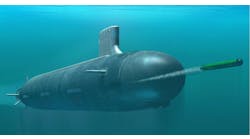Boeing Commercial Airplanes is cutting the rate of production for its 747-8 aircraft to one plane per month, adjusting to the continued decline in demand for the “jumbo jets” that once symbolized Boeing’s command of the commercial aircraft market. The current rate of production is 1.5 planes/month, and the slower rate will effectively extend the viability of the 747 assembly line at Boeing’s complex in Everett, Wash.
Boeing had already been set to reduce the 747 output rate to 1.3 planes/month in September.
The 747-8 is the third-generation of the 747, with an extended fuselage and wings reconfigured from the original design introduced in 1970. It is the largest version of the 747, and the largest commercial aircraft built in the U.S. It is powered by the GE Aviation GEnx turbofan jet engine, the same units available on Boeing’s new long-range aircraft, the 787.
Boeing is enjoying heavy demand for its smaller and newer aircraft, including the 737 and 787 series, but the 747 represents a larger, more expensive option that carriers are less inclined to schedule for the various long-distance or high-volume routes where the jumbo jet may be an option.
Boeing completed only 16 of the jets in 2014, according to its published records, and it recorded no new orders for 747s in 2014. Currently, Boeing has orders to complete 52 new 747 aircraft, and 34 of those are for air-cargo firms.
The rate cut follows Boeing’s recent success at the biannual Paris Air Show, where among other new business it logged an order for 20 new 747-8s from a Russian air-cargo carrier, Volga-Dnepr Group. Reportedly, it was the largest order for the 747 series in more than two decades.
A U.S. Air Force order in February for two 747-8s to replace the current presidential aircraft fleet was widely seen as an effort to secure the jets before Boeing ceased production of the series altogether. USAF requires four-engine jets for its “Air Force One” aircraft, as a security measure.
"With recent orders and commitments, along with these changes announced today, we anticipate a stable future for the 747 production system," according to Bruce Dickinson, vice president and general manager of the 747 program, in a statement.
However, Dickinson also referred to "overcapacity of freighters in the market," suggesting that was prompting Boeing to cut the 747 production rate for the second time this year.
"We are optimistic that we have things in balance now and the cargo market is swinging back quite strongly," he stated.
By cutting the rate again, Boeing is effectively extending the viability of the Everett assembly line by about five months at the current order volume.










